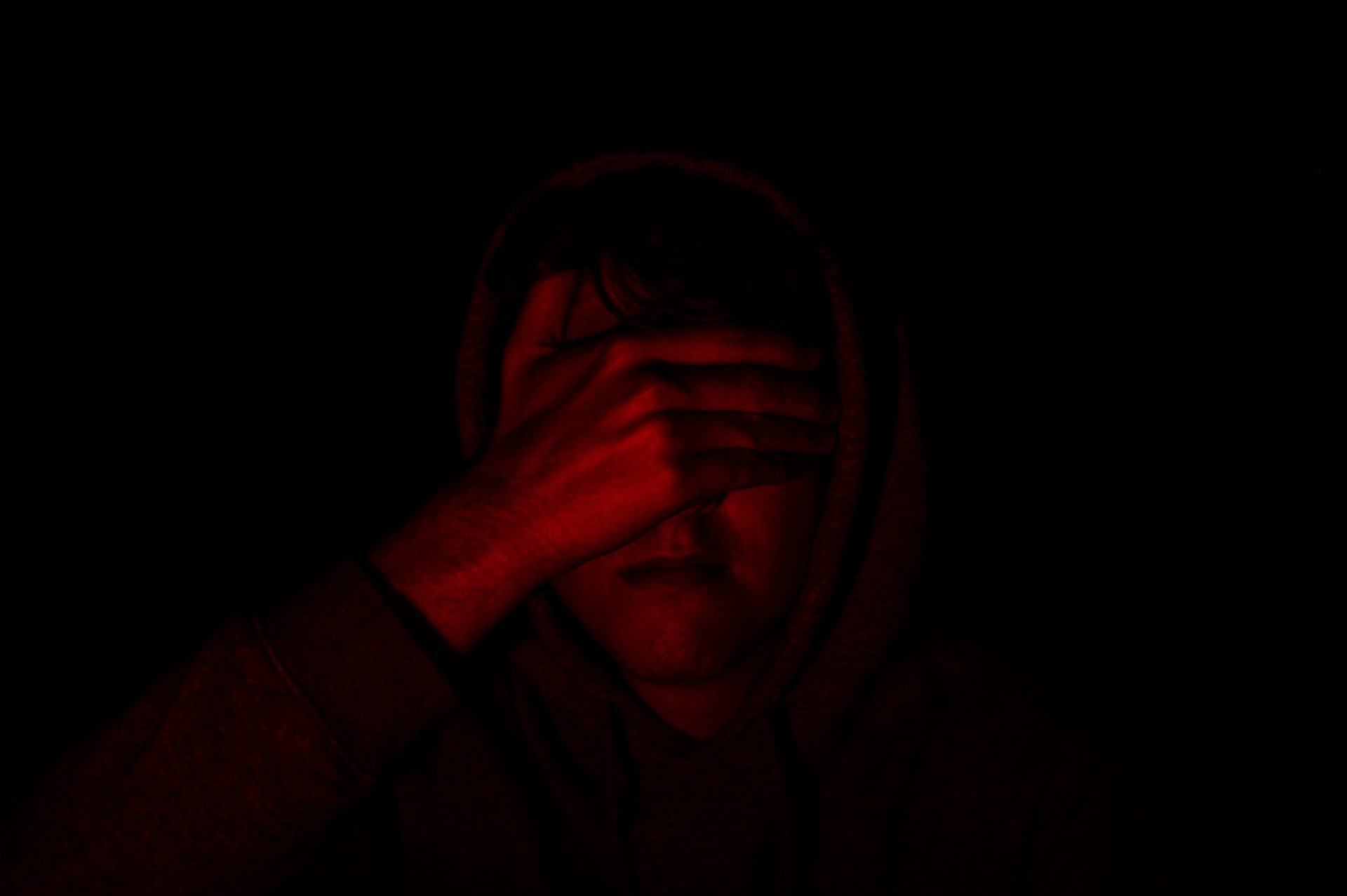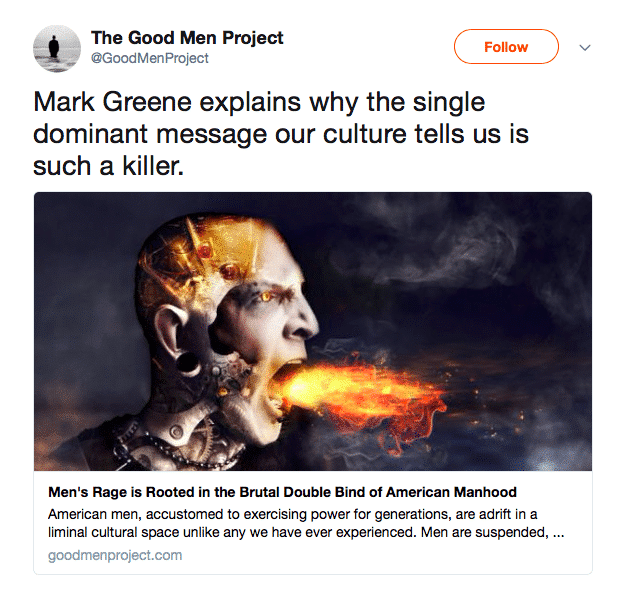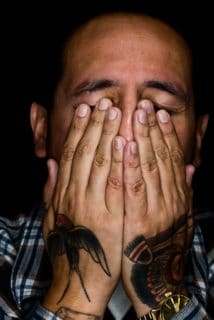The Male Suicide Crisis in the U.S.
Masculinity
In the US men account for 77% of the 45,000 people who kill themselves every year. Here, the publisher of The Good Men Project explains what needs to change for men and the system that controls them.
At The Book of Man we work with the likes of CALM to highlight the issue of male suicide in the UK and the shocking statistic that it is the biggest killer of men under 45. But such troubling statistics aren’t restricted to this country.
In the US, the suicide rate has jumped 30% since 1999 according to a new report by the Centre for Disease Control and Prevention. And men account for 77% of the 45,000 people who kill themselves every year over there.
It is a truly disturbing trend which brings up serious questions about the causes. Experts are pointing to lack of mental health support, the depressive effects of mass medication, and tough economic circumstances and unemployment, but certain male-focused organisations are also delving deeper into the damaging effects of cultural and societal constructions of masculine identity. The strong, tough, bread-winning image of A Man bestrides the globe, and for those who struggle to live up to it – i.e. all of us – it can lead to dark places; particularly since being A Man means you’re not supposed to talk to others about your problems, fears, and insecurities.
One organisation admirably interrogating all this in America is The Good Men Project, a site which aims to support 21st Century men by questioning the issues they face.
We spoke to The Good Men’s Project publisher, Lisa Hickey, about the male suicide crisis over there and the work that needs to be done to change the way men think about themselves.
What are your thoughts on the stats about suicide stats over there?
In the US, male suicide is a big problem which is rising. Particularly for older men. Studies are showing women have more attempts at suicide but men are more successful with them. Things stay steady until both sexes hit their 50s, then all of a sudden the difference between male and female suicides skyrockets. So there’s a critical point to address.
What factors are going into it?
Men are socialised not to talk about their problems and any signs of mental illness or mental unease. They are not supposed to go into therapy or get help. They are expected to man up and take it and get over it.
Those cultural messages to men are so omnipresent most people can’t even see them.
We have seen it starting to change a little bit, but not as much as we’d like. At least some men are publicly coming forward about the problems that they’re having, but it’s going to take way more than that.
What is the key challenge to change things?
There’s a movement, involving the Good Men Project, to get men to understand the social pressures they’re under. To engage in dialogue about it and understand how the pressures of just being a man work in ways that aren’t always to the advantage of men. We’re trying to get people to see that. We want an ‘”a-ha!” experience: something’s wrong and we should do something about it. Often men don’t see it until a time of crisis, and then it’s too late.
Much of the engrained thinking of course is that the male archetype is just the way men biologically are – however we’re seeing it as much more of a societal and cultural thing…
I totally think it’s a societal and cultural thing. And we also approach it from other way too and talk about the disposability of men. Here in the US it’s come out that American football causes severe brain damage, something called CTE (chronic traumatic encephalopathy). It’s not from big concussion incidents, just repetitive hits over time. And almost every football player gets this to some degree, and it often kills them. Actual brain damage, or suicide or drug use or risk taking or other types of behaviour. But it gets back to that to the idea that men are supposed to be heroes, they’re supposed to go to war and be football players, and if some of them die along the way, well, that’s the way it is.
Men do have strengths though don’t they? This isn’t about them removing those things entirely?
No and I think other things can be seen as strengths which can be in addition to what men have already. It’s not that we’re saying there’s something inherently wrong with being a man, not at all – it’s about adding in things to have a richer life. If you add in the ability to have great relationships, to be collaborative not just competitive, to ask for help and be kind – all of that will make your life better.
It seems obvious, but it’s very hard to erase years of cultural conditioning.
Is it difficult to get the message through to the more traditionally macho areas of the States away from the coasts?
We’re definitely finding it that way and even more so with the President who is working against what we’re trying to achieve. He’s sounding the rallying cry that men should be men and should do off and dangerous things and not ask for help, and not be kind and compassionate.
But we’ve found that men have huge pressures to be the financial provider in family situations. Even if their wife works they still feel as if they’re responsible for the finances of the family. So when you get into these areas where industry used to be a big reliable thing and it’s not anymore, that just goes right to the core of men’s dignity and that’s part of what contributes to suicide rates. Especially if they haven’t been conditioned to talk about any of this. Their identity is in crisis and they don’t know what to do.
How does the issue with men differ in the US to the UK do you think?
Here’s the difference between the UK and the US: you guys don’t have guns and mass shootings. When studying the people who do the mass shootings, it’s almost always men, and they usually have a crisis of male identity as a catalyst, right before they go off and become a mass shooter
Sometimes it’s a financial problem, sometimes a love interest, but there’s always some crisis of identity of being your typical male.
The Incels are kind of the same thing – society conditions men to be sexual beings. That’s what being a man’s about and if you can’t get the girl you’re not a man. That message comes across in movies and books and articles and the way men talk to each other so if you’re calling yourself an involuntary celibate it’s because you haven’t been able to fulfil your role as a man. And that makes people very angry.
Trump is visiting over here, at a moment when men are receptive to masculinity being changed. Is he a last kick of the old masculinity or it actually not going away at all?
My working theory is that the reason these socialised male ideals exist is so that a certain amount of men can gain and keep power. Since many ways of gaining economic power have gone away, and the workplace has become more diverse with more women taking jobs, it’s caused those men who want to gain power to abuse the system. Obviously, it’s not all men but the ones who want that power and to keep the power, often use and abuse to get it. And they know they need the complicity of other men – they need other men to look away, to not call them out and assist them by not knowing they’re assisting them.
To me, Donald Trump is the epitome of that dynamic.
I don’t think men care about the traditional archetype of being a man on their own, I think they care about it because the men in positions of power have told them about it.
Does that apply to relationships with women too?
Again, in the case of sexual harassment there are men who are abusers at the top of the abuse pyramid and they need the complicity of other men to continue their abuse. It’s not that men are abusers it’s that they are told over and over it’s nothing. Like, “I scored” or whatever language is used, is saying it’s not a big deal, that its ok.
But now men are understanding it is a big deal. For us it’s about stepping up to say “I understand the system sucks – maybe I’ve done some things that aren’t ok in the past, but I can make up for that now and try and change the system.”
That’s what we see as the path forward. We’re not out to vilify men and we understand the social pressures – we’re all human, not perfect. But we can still say from this day forward we’re not going to be complicit in that system, we’re going to call out abuse when we see it. We want to be doing a better job of making life better for everyone.
Thanks to Lisa. Follow The Good Men Project on Twitter.
Trending

Join The Book of Man
Sign up to our daily newsletters to join the frontline of the revolution in masculinity.



















